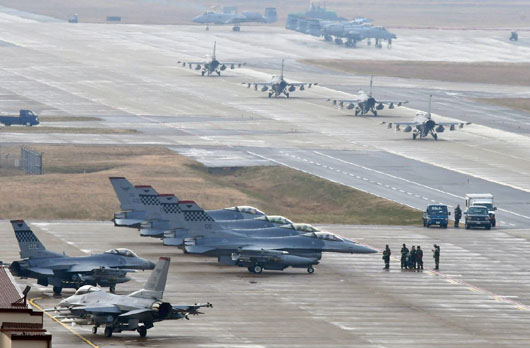by WorldTribune Staff, January 23, 2019
Amid preparations for his second summit with North Korean leader Kim Jong-Un, U.S. President Donald Trump is turning up the heat on Seoul by demanding it pay more for the 28,500 U.S. military personnel stationed in the South.
Some Korea analysts say that U.S.’s leverage with Pyongyang, backed by severe sanctions, has been undermined by the aggressive appeasement policies of the leftist government of President Moon Jae-In in Seoul.
Related: Long-secret U.S.-North Korea intelligence ties revealed on eve of 2nd summit, January 22, 2019

China and North Korea, meanwhile, have worked continuously to splinter the critical Seoul-Tokyo-Washington strategic alliance.
And South Korean conservatives, pointing to the U.S. military pullout from Syria, fear the Trump administration will withdraw U.S. forces from the South as part of a deal with North Korea.
North Korea is using the tug-of-war between the U.S. and South Korea over sharing costs for U.S. Forces Korea (USFK) “as leverage to strengthen its argument that the South should unite with the North to fight against foreign powers,” said David Maxwell, senior fellow for the Foundation of Defense Democracies.
North Korea’s party mouthpiece Rodong Sinmun last week published an editorial titled “the intention behind the demand to increase defense costs,” where it said the U.S. is not treating the South as its ally. It said the U.S. is only pursuing its own interests while hampering the progress of peace talks between the two Koreas.
“That the U.S. is demanding the increase of South Korea’s share of defense costs runs counter to the current tension-easing atmosphere on the Korean Peninsula,” the editorial said. “The South and North are committed to alleviating military tension on the Korean Peninsula and taking steps to effectively deal with the danger of war by implementing the measures agreed by the two sides through the Panmunjeom Declaration and September Pyongyang joint declaration.”
Under such conditions, the editorial said, “it is anachronistic to demand the increase of defense costs contribution by imposing the costs of the deployment of U.S. strategic assets to the Korean Peninsula.”
Maxwell noted that “Despite 10 rounds of negotiations led by veteran diplomats last year, the U.S. and South Korea failed to reach an agreement on the level of cost sharing.”
U.S. Ambassador to South Korea Harry Harris visited Cheong Wa Dae in an apparent move to pressure Seoul on the issue, Seoul-based daily newspaper Dong-A Ilbo reported on Jan. 21.
According to the report, Harris said Washington may consider “implementing the South Korea-U.S. Mutual Defense Treaty in a different way,” during a closed-door meeting with national security adviser Chung Eui-Yong. The U.S. Embassy in Seoul refused to comment on the matter.
Related: South Korea white paper removes North Korea as ‘enemy’, January 22, 2019
Scott Snyder, senior fellow for Korea Studies at the Council on Foreign Relations, noted that “Historically, the alliance with South Korea and strong trilateral U.S.-Japan-South Korea alliance coordination have served as the backbone undergirding the U.S. position on North Korea. Trump must put his affairs in order to strengthen his hand going into a second meeting with Kim Jong-Un, hopefully by stopping in Tokyo and Seoul to shore up the U.S.-ROK-Japan alliance en route to his rendezvous with Kim in Southeast Asia.”
At this time, Snyder said, “there is no public evidence to suggest that the working-level dialogue channels necessary to produce a mutually agreed upon definition of denuclearization or that the steps required to reach that objective have been identified, despite continued U.S. efforts by Special Representative Steven Biegun to do so. Secretary of State Mike Pompeo secured an agreement from Kim Jong-Un to establish such a dialogue while in Pyongyang last October, but no visible progress has been made on this front.”
Snyder added: “It is possible that Kim Jong-Un has realized that the way forward with the U.S. will involve the choice to sacrifice some portion of his nuclear and missile arsenal to achieve economic objectives. It is also possible that he has instead settled on one more gamble designed to maneuver Trump into accepting North Korea as a nuclear state, with the assurance that Kim’s nuclear arsenal will point elsewhere.”
Check Out Geostrategy-Direct __________ Jump Start the U.S. Media
